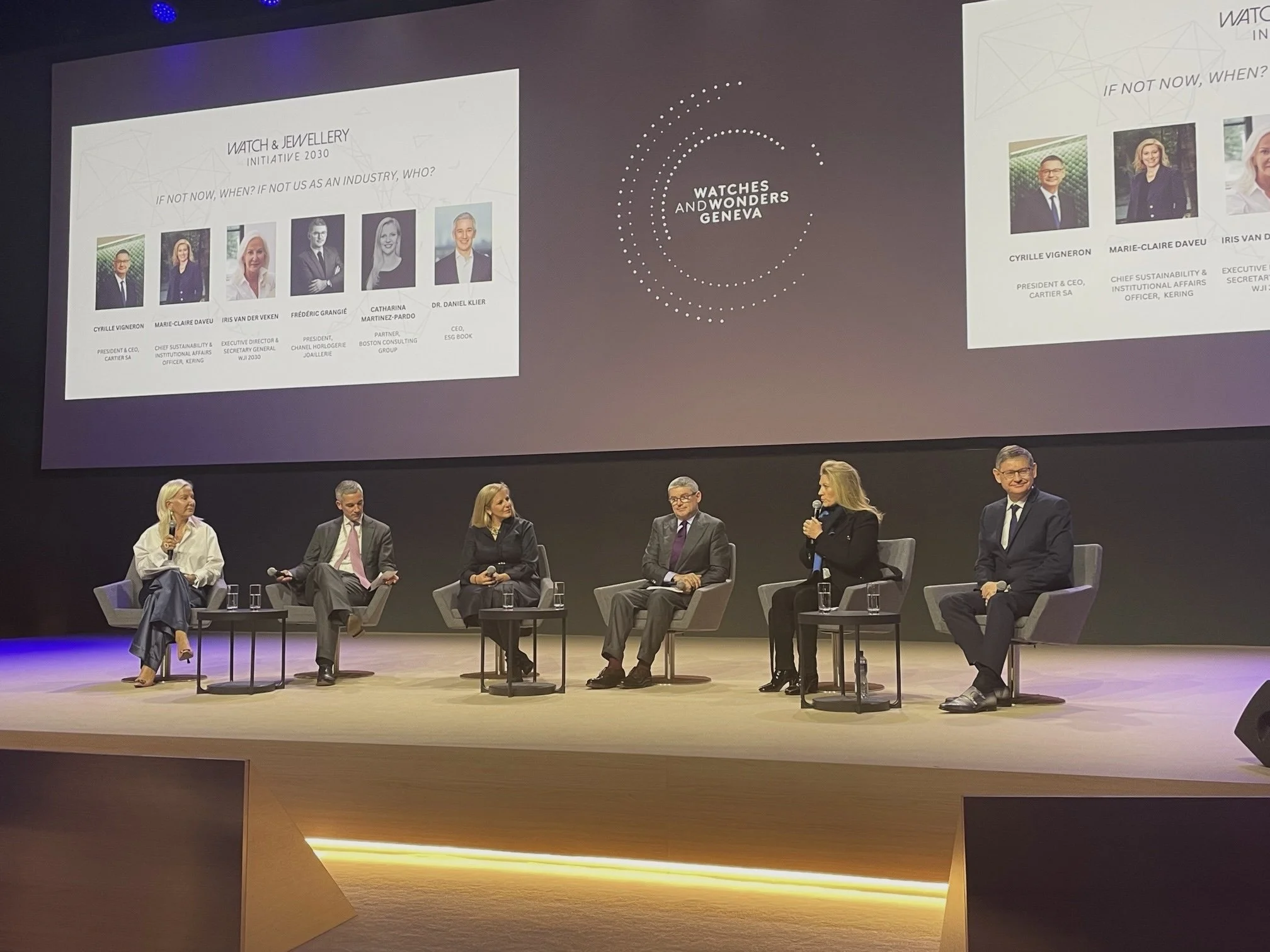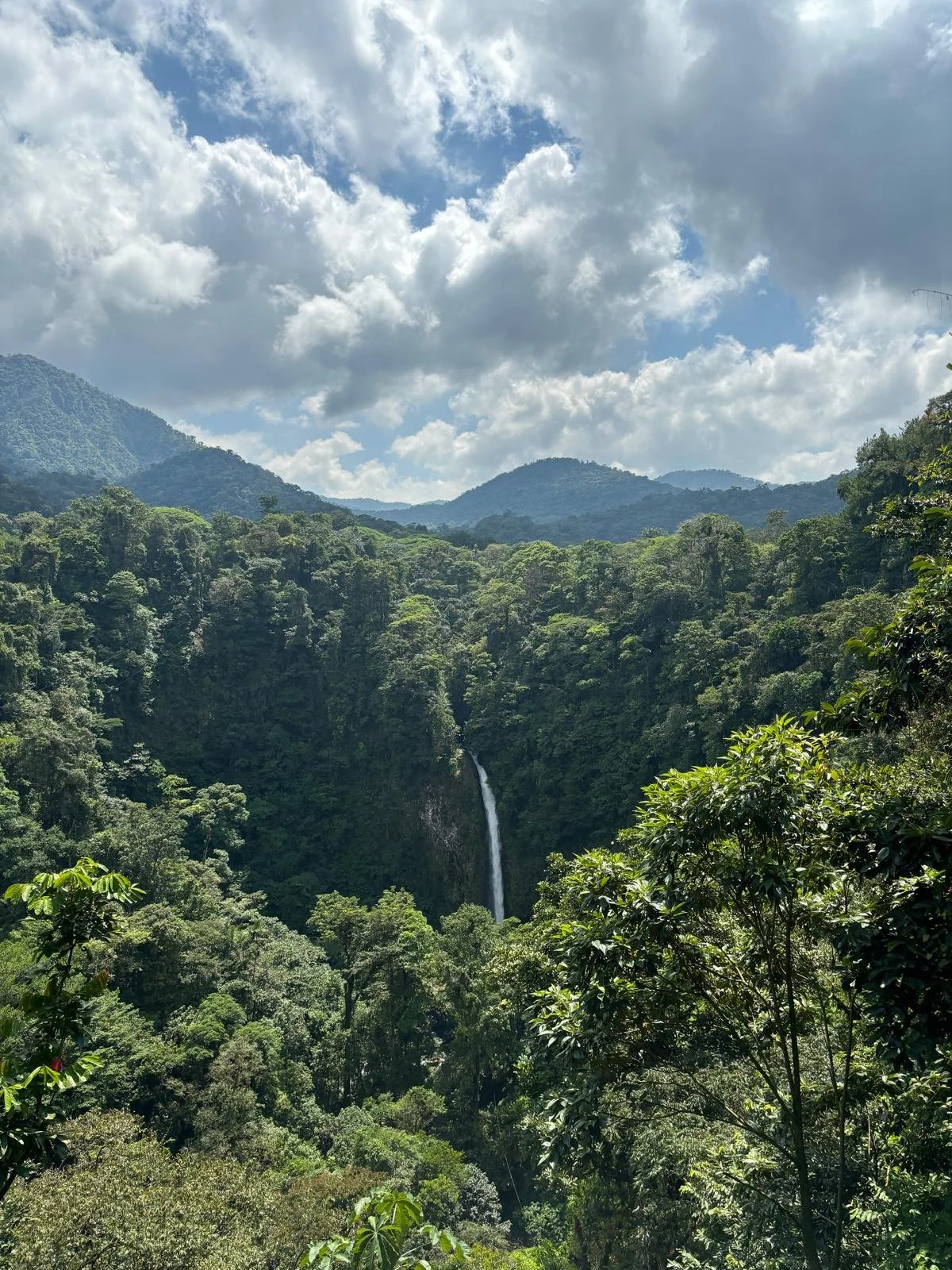
The Journey to
Sustainable Luxury
My journey
"Education is the most powerful weapon." This famous quote by Nelson Mandela is the cornerstone of my career.
For over 25 years, I've been crafting training strategies for the luxury sector, acquiring in-depth expertise in the development, and upskilling of employees and managers. Every day, I put into practice my belief that education is transformative.
Driven by a passion for sustainable development, I pursued executive training at IMD Lausanne, "Winning Sustainability Strategies." This equipped me to design training programs addressing the sustainability challenges in luxury.
My tenure at Maison Chopard was pivotal. Witnessing their remarkable efforts in sustainable sourcing and community impact solidified my conviction that the luxury industry can drive positive change. The shift toward sustainable luxury is underway, marked by encouraging progress.
I firmly believe luxury can lead in sustainability. The journey is long and demanding, requiring collective efforts from all brands. Raising awareness among employees is crucial, and it is my mission to embed this change throughout the industry.
My Mission
My mission is to raise awareness on the Journey to Sustainable Luxury. Sustainability is everyone’s business in a company and must be embodied by all employees, managers and Top management. I help companies develop and implement impactful Training solutions to raise the awareness of all the employees on their CSR achievements and the transition towards a more sustainable future.

SUSTAINABLE LUXURY
Watches & Jewellery
Dive into the journey to a more sustainable Watch & Jewellery industry.
Beauty
From Sustainably sourced Natural ingredients to Eco-design.
Hospitality
Discover how the Hospitality industry is starting its Journey to Sustainable Luxury.
Coups de Coeur
Discover my favorite Books, Podcasts, Brands, and Products.

Watches & Jewellery
“If not the Luxury industry, WHO? If not now, WHEN?”
Articles:
Watches & Wonders : A reflection on sustainable Luxury (2022-2024)
Watches & Wonders Geneva is the premier event for the horology world, offering a pulse on watchmaking advancements, particularly in sustainable development and Corporate Social Responsibility (CSR). Each year, it draws an increasingly youthful audience, indicative of the evolving consumer base in luxury.
-
2022: THE DAWN OF SUSTAINABLE COMMUNICATION
The 2022 Edition marked a pivotal shift, with sustainability at the forefront of discussions and presentations. Brands like Panerai, Oris, Baume, TAG Heuer, and the independent ID Genève highlighted their sustainable practices.
However, some brands were still clinging to the notion that watches are inherently sustainable due to their generational longevity. Fortunately, the industry moved towards more substantial storytelling.
A major milestone was the introduction of the Watches and Jewelry Initiative 2030, highlighting a significant stride in collaborative efforts towards a more sustainable Luxury industry. Driven by a shared belief that global Sustainable Development Goals (SDGs) and responsible industry aspirations require collaboration, Cartier and Kering launched this initiative in 2022.
2023: EMBRACING COLLABORATION AND OPEN SOURCE
The 2023 edition built on the previous year’s momentum, focusing on feedback from the Watches and Jewelry Initiative 2030. The major theme was collaboration and open-source innovation, signaling a collective effort within the industry to tackle sustainability challenges. Brands recognized the importance of working together, sharing best practices, and implementing joint strategies to make significant strides in sustainability.
2024: SHIFTING FOCUS AMID GLOBAL CHALLENGES
In 2024, the emphasis on sustainability communication noticeably waned, likely due to geopolitical and economic pressures. Despite fewer conferences dedicated to sustainability, actions continued behind the scenes. Oris stood out by addressing the broader carbon footprint associated with travel and logistics, emphasizing the need to reduce emissions beyond just the production process.
ID Genève, although not officially part of the salon, remained a beacon of circular economy practices, garnering well-deserved recognition and success.
NOTABLE HIGHLIGHTS AND “COUPS DE COEUR”
• Watches and Jewelry Initiative 2030: A pivotal platform promoting collaborative action among suppliers, brands, and stakeholders to address sustainability challenges collectively.
• Mike Horn's Emotional Speech: An inspiring talk on life and passion from the renowned explorer.
• Gianfranco Ritchel's Presentation:A tribute to the craftsmanship of watchmakers ; The latter are often the forgotten ones and it's important to pay tribute to their exceptional work, reminding me of the know-how of master perfumers who rely on quality raw materials sourced from local communities.
• Oris's Honest Approach: Acknowledging the broader environmental impact of watchmaking and striving to address these challenges earnestly; “it’s not easy being green”.
REFLECTIONS ON THE NEW FORMAT OF 2024
The 2024 edition saw significant changes in the event format. The removal of beloved roundtable discussions and panels like the "Morning Show," "Late Show," and "Timepiece Talk" was particularly disappointing. These sessions, featuring distinguished speakers such as watchmaking expert Joanna Lanje, Gianfranco Ritchel, and Carson Chan, were cherished for their depth, insight, and international perspectives.
These events offered rich, engaging dialogues that provided attendees with a comprehensive understanding of industry trends, challenges, and innovations. The quality of these speakers and the breadth of their knowledge were instrumental in elevating the event's intellectual and educational value.
In contrast, the 2024 edition's shift towards an "Instagram" format, while effective in delivering concise trend updates, lacked the depth and engagement that made previous editions so compelling. The new format prioritized brevity and visual appeal over the in-depth discussions that had become a hallmark of the event. While it succeeded in providing quick, accessible information, it left many yearning for the more substantial interactions of past years.
Watches & Wonders Geneva has evolved significantly from 2022 to 2024, reflecting the luxury watch industry's ongoing commitment to sustainability. Despite the fluctuations in communication intensity, the underlying actions and innovations continue to drive the sector towards a more sustainable future. This journey underscores the luxury watch industry's dedication to aligning with the values of modern consumers, ensuring that the allure of exquisite timepieces is matched by a commitment to sustainable luxury.
Sources : Watches and Wonders (www.watchesandwonders.com)
Watch & Jewellery Initiative 2030
“No one can do it alone” ; Driven by a common conviction that the global Sustainable Development Goals (SDGs) and aspirations for a responsible industry can only be achieved through collaborative efforts, the Watch and Jewellery Initiative 2030 (WJI 2030) was launched by Cartier and Kering in 2022. This Initiative stems from the observation that collaborations within the luxury industry are key to accelerating the necessary transformation. In all sectors of the Luxury industry, Beauty, Fashion and now the Watch and Jewellery industry, there is a growing awareness that collective work is the only way to make a positive impact all allong the value chain.
-
The Initiative focuse on three main pilars : building climate resilience, preserving resources, and fostering inclusiveness.
All watch and jewellery players (Maisons, suppliers and business partners) are invited to join this initiative. In 2023 there were more than 50 members.
Maison and Partner Members are required to meet the WJI 2030 minimum commitments, which revolves around the three pillars. As it is more challenging for small and medium-sized businesses to fulfil these commitments, the WJI 2030 has launched training modules and support programms with experts.
A tremendous support
For the first Pillar on Climate Resilience, WJI2030 launched the SBTi for SMEs training module with help desk support with experts.
For the 2nd Pillar, on preserving resources, they provided expert helpdesk sessions, face-to-face workshops, and webinars, to enable and activate companies on their nature journey
For the 3rd Pillar, Fostering Inclusiveness, a Human Rights Navigator Tool has been developed in December 2023; the Navigator provides guidance, tools, and insights from experts and members related to the prevention and mitigation of human rights impacts.
This fully demonstrates the watch and jewellery initiative's commitment and its desire to move forward with concrete projects and actions. Even better, all the tools and materials will ultimately become open source for the wider industry.
On the 3rd pillar, which is about fostering inclusiveness, the WJI 2030 joined The Women’s Empowerment Principles (WEPs). Established by the UN Global Compact and UN Women, provide a set of 7 Principlesthat offer guidance to all businesses, on how to promote gender equality in the workplace, marketplace and community.
WOMEN EMPOWERMENT – SDG5
if the current rate of progress continues, achieving full gender equality, one of the 17 Sustainable Development Goals (SDGs), could take close to 300 years!
Therefore, countries will not meet SDG5 by the 2030 deadline.
To reverse this trend, JWI 2030 have joined hands with UN Women WEPs team to action and lead the way forward.
NATURE ROADMAP
During the Las Vegas Sustainability Summit on May 30 2024, the Watch and Jewellery Initiative 2030 launched the Nature Roadmap, a framework for businesses to act together in response to the nature and biodiversity crisis with guidance on the key steps that companies need to take – Assess, Commit, Transform, and Disclose.
The Nature Roadmap is designed to guide, support, and inspire organisations on their nature-positive journeys. It offers practical tools and insights to help companies integrate biodiversity into their business strategies, ultimately creating value for both their operations and the environment.
Biodiversity is crucial for the watch and jewellery industry. Risk analysis shows that businesses cannot survive without nature and its many essential services. Recognizing this, WJI 2030 is committed to leading the sector in promoting sustainable practices that protect and restore nature.
The launch of the Nature Roadmap reflects WJI’s collective commitment to sustainability and the vision for a future where business and nature thrive together.
To summarize, WJI 2030, is a global initiative open to all Watch and Jewellery players. Its mission is to create positive outcomes for the planet and for people by uniting watch & jewellery industry stakeholders with ambitious goals, shared learnings, and collaborative, high-impact projects.
With such powerful and positive initiatives, the Journey towards a more Sustainable Luxury is on its way.
Source : Watch and Jewellery Initiative 2030 website
Watches and Wonders 2024
Every year, Watches & Wonders Geneva organises several conferences to provide a better understanding of market trends and developments including the latest regarding sustainability. Education plays a key role in accelerating the transition to a more sustainable luxury.
In this video, discover my “favorites” of this 2024 Edition.

BEAUTY
SKIN CARE & FRAGRANCES
“Growth is good; Responsible Growth is even better”
— Patrick Firmenich
Articles:
Luxe Pack Special Edition, Paris 2024: Embracing Sustainable Luxury Packaging
Attending Luxe Paris 2024 was an enlightening experience, particularly the focus on “best practices” regarding sustainable packaging solutions during the various conferences. As the only trade show that gathers eco-friendly packaging suppliers and major industry players, Luxe Pack Paris stands out by addressing environmental challenges with concrete solutions. Here’s a closer look at the key highlights and insights from the conferences.
This 2024 edition of Luxe Pack brilliantly showcased that eco-conception, which involves integrating the environment from the conception of a product or service through all stages of its lifecycle, is becoming essential in the luxury sector.
-
What is Eco-Conception and What Are Its Challenges?
Eco-conception requires rethinking the product and its functionalities; it involves significant work on the real issues of the product, its optimization, and the search for more innovative solutions in terms of usage for a world in harmony with the resources we have. The goal of eco-conception is not to create a "zero impact" product but to create products that are coherent with the resources and the ecosystem's capacity to absorb pollution.
As the economic model shifts towards a functionality-based economy, this must be integrated into the strategy. Therefore, eco-conception requires rethinking strategy and economic models. Eco-conception cannot be done individually but globally, where everyone participates. Co-creation is a team effort that requires breaking down silos and adopting a new mindset.
This collective work involves defining the eco-conception roadmap, its challenges, and then engaging and educating teams by giving meaning to the roadmap. The challenge is to successfully co-create together nurturing creativity and being a source of inspiration. Integrating eco-conception from the very first step is always a challenge, particularly in engaging all teams, requiring enormous effort in raising awareness and training. To streamline and break down silos, it is important to engage in awareness and training initiatives so that all departments are educated on eco-conception.
The success of this transition requires breaking down silos, engaging, explaining, raising awareness, and training marketing teams and others to increase competence. Integrating environmental considerations very early in the development process is crucial.
Eco-Desirability: Creating New Imaginaries
Eco-desirability involves creating new imaginaries, challenging aesthetic codes, and questioning how marketing integrates planetary limits. Luxury brands have the ability to reinvent storytelling and create new consumption habits. For example, Louis Vuitton redesigned its sneaker boxes, creating a 2-in-1 packaging that also serves as a shopping bag.
The perception of luxury and the quality of recycled materials varies by country, particularly regarding recycled papers. In Germany, everything is recycled, which is perfectly integrated into the mindset of German customers. In France, recycled paper is ultra-white, adding a chemical process. There is a challenge to make "off-white" desirable, which is a key issue in making recycled materials appealing.
How to be Eco-Desirable: Innovation and Creativity
Some brands like Boucheron have completely reinvented their jewelry cases with the goal of reducing the environmental footprint of the new object to its minimum. In this eco-conception approach, all stages of the lifecycle have been optimized to reduce the environmental footprint, from the choice of raw materials to their end of life.
The old case, composed of 11 materials, has been transformed into a case made of two natural, traceable, and recyclable materials: aluminum and wool felt, certified by the Responsible Wool Standard. The case has thus been completely rethought and reinvented under the guidance of Hélène Poulit-Duquesne, Boucheron CEO, "No pack is the New pack."
This ultra-innovative and bold case anticipates regulations, as if cases are classified as packaging, then by 2030, all cases must be recyclable to be marketed in the European Union. Boucheron has anticipated this by designing the case of the future.
The traditional gesture of opening a jewelry case with its flap system is deeply ingrained in the collective imagination of marriage proposals. The sales ceremony has therefore been reinvented to engage customers in this new eco-conception narrative.
In the beauty sector, Fôme embodies eco-desirability with brilliance. This young startup has completely rethought the handwashing ritual by developing a powdered soap to be diluted with water, presented in a superb glass bottle case and eco-designed refills made from 100% recycled apple paper, with a very refined and elegant design.
Coopetition: The New Era
This Luxe Pack 2024 Edition clearly confirmed that we have entered a new era; the transition from traditional competition to a dynamic of "coopetition" to catalyze the transition to a circular economy. Scaling circular models invites companies to form coalitions, whether to standardize practices, share costs, or play a true role of influence in the market. Various speakers addressed the inherent challenges of forming these coalitions with great transparency and lucidity, and explored solutions to maximize collective efficiency in pursuing a more sustainable and circular economy.
A perfect example of coopetition is the Circul’R Coalition. Since December 2023, 11 major companies in the cosmetics industry (L’Oréal, Chanel Parfums Beauté, Pierre Fabre, Laboratoires SVR, Yves Rocher, Clarins, Melvita, La Rosée, Aromazone, Nocibé, and Séphora) have united within this coalition to explore the opportunities and challenges related to implementing a deposit system for cosmetic products.
Launched with the support of We Don't Need Roads and Citeo's reuse fund, this coalition aims to launch a pilot deposit project on skincare products in stores by the end of 2024. This initiative demonstrates the industry's collective will to reduce single-use packaging, aligning with the ambitions of the AGEC law.
This initiative highlighted one of the major challenges of both reuse and product refills: how to reconcile consumers' desire for new products with reuse and refill capsules.
Reuse, Bulk, and Deposits: Changing Consumer Habits
Eco-design also means encouraging new consumption habits. The challenge lies in getting consumers to adopt these new habits, especially in industries like cosmetics where product changes are frequent.
A glass bottle is optimal in terms of its footprint only if it is used at least fifteen times. The same goes for refills; a refillable package significantly reduces its environmental impact only if it is used multiple times. This implies repeated purchases by consumers rather than constantly changing beauty products. It also requires an honest awareness within the beauty sector that the incessant multiplication of new product offerings contradicts an eco-responsible approach. The most eco-responsible product is the one that is not created, so the race towards always more references in perfumes, skincare, and makeup responds to an economic model that perhaps needs to be rethought.
These elements demonstrate the complexity of transitioning towards more sustainable luxury.
It’s interesting to note that there is no significant market gain if brands move towards new models such as eco-refills, bulk packaging, and deposits. In fact, even if most customers say they are prepared to pay more for a greener product, this is still a declarative statement, but false when it comes to buying. On the other hand, brands have a lot to lose if nothing is done about the environment and a more virtuous business model. According to a Kantar’s study, 45% of UK consumers are prepared to stop buying from brands if the brand does not prove that it is committed to sustainable and virtuous development.
Challenge and Opportunities for Retailers: Sephora’s Case
Big players like Sephora can significantly influence the shift towards more responsible and sustainable luxury. According to Katarzyna Wisnewska, CSR Director, Sephora holds three major environmental "superpowers":
1. Selecting the Assortment: By choosing what products to stock, Sephora influences brands and how they think and create their products.
2. Influencing Consumers: By offering a curated selection, Sephora can guide consumers towards more sustainable choices.
3. Sephora's Own Operations and Private Label : Sephora Collection can set an example through its own eco-friendly practices.
To successfully reduce its impact, eco-design requires a broad perspective. This means orchestrating various options like recycling, refills, and deposit systems. It involves training teams and providing clear communication to customers about the diversity of options available. For instance, in the perfume sector, some refills perform well due to the right mix of format, price, packaging, and shelf placement, while others do not succeed because the overall marketing mix is lacking.
For a retailer, reuse presents a significant challenge in eco-design. Questions about how to integrate bulk sales, deposit systems, and refills into the store layout need addressing. Additionally, deciding how prominently to feature these commitments in communications is crucial. For example, during Valentine's Day, highlighting refillable products and linking them to loyalty incentives can drive success. Offering price incentives on refills and rewarding customers with extra loyalty points encourages adoption.
Brands and retailers must work together to raise awareness about refills. At Saint Laurent, refills are a core part of the communication strategy from the product launch. Brands must consider which products to offer as refills, in bulk, or through deposit systems, ensuring a cohesive and effective approach.
Sephora: Challenges in Refills, Bulk, and Deposit Systems
According to a study by Sephora, 95% of consumers are unaware that their perfume bottles can be refilled. This highlights the importance of training and educating both sales advisors and customers to raise awareness about the potential for refilling prestige packaging. Incorporating this into the sales ceremony is also crucial.
Sephora offers multiple refill options: eco-refills, in-store refills, and pioneering systems like Mugler’s fountains, which account for around 50% of their reuse sales. Additionally, Sephora is working on a deposit system project.
Category Management Challenges An example of the complexity in category management is seen with foundation shades. Over the past decade, the number of available shades in Sephora has increased sixfold to be more inclusive. If each shade were offered as a refill, it would double the assortment. Managing such a diverse range of refills without overstocking or creating unsold inventory is a significant challenge.
Orchestrating Offers
Effectively managing recycling, refill, and deposit options requires training teams and clear communication to customers. For instance, in the perfume sector, some refills perform well when the format, price, packaging, and shelf placement are optimal. Others struggle due to a less effective marketing mix.
The Reuse Puzzle for Retailers
For retailers, integrating reuse into store eco-design is a complex puzzle. Decisions about how to incorporate bulk sales, deposit systems, and refills into the store layout must be made. It's also essential to determine how prominently these initiatives should be featured in marketing communications.
Sephora and other brands must continuously work on raising awareness about refillable options. Effective category management, clear communication, and strategic marketing are key to integrating sustainability into luxury retail.
Regulation: A Catalyst for Innovation
As Geraldine Poivert, President and Co-founder (Re)Set, emphasized, “Regulation is not the end goal but a starting point”. It pushes companies to innovate and align their economic models with ecological goals. That’s why she insisted on the fact that companies need to self-regulate effectively; Compliance addresses the gap when companies do not self-structure effectively.
The AGEC Law mandates that 5% of packaging be reusable by 2023, increasing to 10% by 2027. This legislative push is essential for achieving a circular economy. However, it also requires significant effort to harmonize practices and ensure consumer behavior aligns with these goals.
Regulations like the PPWR set recyclability requirements and drive progress by creating new standards. Compliance ensures that companies continuously reassess their economic models to limit their impact.
Regulations drive progress by creating new standards and encouraging companies to go beyond mere compliance.
A Holistic Approach to Eco-Design
In summary, Luxe Pack Paris 2024 showcased the luxury industry's commitment to sustainability and its desire to collaborate as no one can do it alone.
Taking into consideration that 80% of environmental impacts are determined during the design phase, eco-design is not an option.
For eco-design to be effective, it must be part of a broader strategy that includes questioning our consumption needs. Brands need to integrate eco-design into their overall strategy, remembering that it must be supported by a viable economic model.
Cooperation at all levels is essential, and legislation, despite its constraints, often spurs companies to innovate and constantly reassess their economic models to limit their impact.
Reuse and refill are not enough to drive new consumers. However, the lack of a sustainable approach can result in consumer backlash, especially from younger generations.
The success of this transition requires breaking down silos, engaging, explaining, raising awareness, and training marketing and other teams to enhance their competencies.
The most remarkable thing is the very positive momentum felt at all these conferences, which have brought together participants from diverse major companies and start up such as LVMH, Pernod Ricard, Pépite Raisin, Woola, Circul’R, (Re)Set, Kering, cooperative MU, We don’t need Roads, to name but a few.
The Journey to a more sustainable Luxury is on its way.
Elevating fragrance gifting
Looking at the offer of fragrance coffrets during Christmas seasons, there is a major gap between sustainability claims and reality of the commercial offer in the beauty stores.
In this video, I address the challenge for Beauty brands to remain true to their values by offering gift sets that are truly aligned with sustainability.

HOSPITALITY
LODGES & HOTELS
"Sustainability in luxury hospitality is not just about preserving the environment but also about creating a legacy that enriches the local community and culture."”
— Horst Schulze, Former President of Ritz-Carlton Hotels
Articles:
Celebrating Sustainability: Six Senses Hotels & Resorts Shine at the 2024 Positive Luxury Awards
The Positive Luxury Awards celebrate innovation, real change, and higher standards across the supply chain, recognizing brands, retailers, and suppliers at the forefront of sustainable luxury. This prestigious event offers a platform for organizations to showcase their commitment to sustainability and be rewarded for their leadership in the luxury industry.
-
Open to all luxury brands, retailers, and suppliers, the awards cover categories such as Beauty & Fragrance, Fashion & Accessories, Jewellery & Watches, Premium Drinks, Travel & Leisure, and Interiors & Living. An independent panel of judges, including Iris Van der Veken, Executive Director of the Watches & Jewellery Initiative 2030, evaluated the nominees based on their innovation, impact, and commitment to higher standards.
This year, Six Senses Hotels & Resorts emerged as the standout winner, taking home two coveted awards: Positive Luxury Travel Business of the Year and Positive Luxury Responsible Business of the Year. These accolades underscore Six Senses’ unwavering dedication to integrating sustainable practices across their operations.
POSITIVE LUXURY TRAVEL BUSINESS OF THE YEAR
The Positive Luxury Travel Business of the Year award recognizes a Travel & Leisure company that has seamlessly integrated sustainable practices, setting new benchmarks in the industry. Six Senses Hotels & Resorts demonstrated a comprehensive approach to sustainability, which includes a zero-waste philosophy and innovative upcycling initiatives.
POSITIVE LUXURY RESPONSIBLE BUSINESS OF THE YEAR
Winning the Positive Luxury Responsible Business of the Year award highlights Six Senses' comprehensive and impactful sustainability efforts over the past year. This award is given to the luxury business that has raised the bar and demonstrated real change in embedding sustainability into every aspect of their operations.
Six Senses’ approach to sustainability is holistic and community-focused. They were among the first signatories of the Global Tourism Plastics Initiative, led by the UN Environment Programme and the UN World Tourism Organization, in collaboration with the Ellen MacArthur Foundation. This commitment is reflected in their practices, from sourcing locally to minimizing waste.
HIGHLIGHTS OF SIX SENSES’ SUSTAINABLE PRACTICES
Farm to Fork
Each Six Senses property boasts an organic garden supplying fresh herbs, vegetables, and fruits to their kitchens, spas, and Alchemy Bars. Their hens produce fresh eggs in a serene environment, while partnerships like the one with NGO Rise Beyond the Reef in Fiji support local economies and empower women. This initiative has significantly impacted Fijian communities, enhancing economic opportunities and promoting environmental sustainability.
Clean Water and Sanitation
Access to clean water is another cornerstone of Six Senses’ sustainability efforts. They provide clean water and sanitation to local communities, reducing single-use plastic through filtered and bottled water solutions. This initiative not only supports health but also enhances overall community well-being.
Grown in, Not Flown in
Six Senses’ commitment to local sourcing extends to their food and spa treatments. Organic gardens produce fresh fruits and vegetables, herbs are distilled on-site for essential oils, and free-range chickens and beehives contribute to a sustainable ecosystem. Their goats help process landscaping waste and provide milk for homemade cheeses.
Upcycling Initiatives and Zero Waste
Transforming crushed glass into ornaments, repurposing materials for new furniture, and composting food waste for organic gardens.
Six Senses partenership with Fiji NGO Rise Beyond the Reef to support the local economy and empower women. Rise Beyond the Reef teaches women in remote Fijian communities to create and sell traditional crafts, which Six Senses use in their villas and restaurants.
Since 2015, Rise Beyond the Reef has empowered over 300 women and improved employability for nearly 50 leaders; additionally, it has positively impacted the environment with a 150% increase in source materials like plants and vines.
Sustainability Fund
Six Senses’ sustainability fund, comprising 0.5 percent of revenues, all proceeds from soft toy sales, and 50 percent of house-bottled water sales, is used locally to improve quality of life and restore habitats and wildlife populations.
The 2024 Positive Luxury Awards have highlighted Six Senses Hotels & Resorts as a beacon of sustainability in the luxury industry, setting an inspiring example for others to follow. Their innovative practices and commitment to making a positive impact on the environment and communities make them deserving winners of these prestigious awards.
Sources: Positive Luxury (http://www.positiveluxury.com) and Six Senses (http://www.sixsenses.com)
The challenge of Hotel Amenities
"Guestrooms reflect the hotel's vision, for me it’s a canvas for communicating the journey towards a more sustainable luxury hospitality industry. But are all elements contributing to this vision?"
In this video, I take you on a personal journey exploring the delicate balance between unique customer experiences and sustainability in the world of luxury hospitality.
COUPS DE COEUR
Cueilleur d’essences. Dominique Roques
BOOKS
A Tribute to the Keepers of Tradition: A Review of "Cueilleur d'essences" by Dominique Roques
In October 2021, Dominique Roques presented his book "Cueilleur d’essences" at the Société des Arts de Genève. This compelling work pays homage to the traditions of local communities who cultivate raw materials for the perfume industry, such as Vetiver, Vanilla, and Oud. Roques highlights the individuals who pass down these traditions through generations, ensuring the continuity of their invaluable knowledge.
-
In his presentation, Roques discussed the rapidly evolving role of buyers, now increasingly driven by sustainable development. This shift is largely influenced by consumer expectations for more responsible practices. A crucial point Roques emphasized is the pricing of natural raw materials, which must be fair to ensure sustainable production.
Taking Laos as an example, a major producer of Benzoin, Roques noted the challenges posed by Chinese investments in land and infrastructure, such as the China-Laos railway. This development pressures local agriculture, making it vital for the perfume industry to actively support local farmers if they wish to continue using these precious resources.
Roques drew parallels with the artisanal gold mining sector, where consumer demand for transparency has led to the implementation of standards and certifications. However, these measures often overlook local specificities and constraints. Similar issues of traceability arise in the supply chains of both industries, underscoring the need for comprehensive solutions.
Roques called for a reassessment of product positioning and pricing strategies within the perfume industry, emphasizing the necessity for a collective commitment from both perfume houses like Firmenich and their luxury clients. Only a unified approach can yield substantial results. Consumers, too, play a pivotal role by demanding greater transparency and understanding the true costs behind their fragrances.
The luxury industry’s reputation now hinges not only on its exceptional craftsmanship and quality materials but also on its social and environmental responsibility throughout the supply chain. Companies like Firmenich, with their "NaturalsTogether" program, and local firms like Nelixia in Central America, are already making significant strides. These initiatives aim to improve the living conditions of local farmers while ensuring the supply of high-quality raw materials.
In "Cueilleur d’essences," Roques eloquently captures the intricate balance between preserving traditions and adapting to modern sustainability demands. This book is a powerful reminder of the ongoing journey towards a more ethical and transparent perfume industry.
This insightful presentation was followed by a cocktail and book signing session in the splendid and historic Grand-Salon of the Palais, where the International Committee of the Red Cross was founded in 1863. A heartfelt thank you to all the organizers for this magnificent conference. As Dominique Roques aptly remarked about his sourcing profession, "We set out to find goods and return with stories"—stories that inspire and enchant.
Personally, "Cueilleur d’essences" is one of the books that has most profoundly inspired me. I truly recommend everyone to read it. It’s an amazing journey into sustainable sourcing, and Dominique Roques perfectly transmits his passion.
Firmenich sourcing
NaturalsTogether initiative
Firmenich: A Legacy of Sustainability and Ethical Excellence
Long before their groundbreaking merger with DSM, I had the extraordinary opportunity to immerse myself in the fascinating world of Firmenich’s natural ingredients. For years, Firmenich has been celebrated as a global leader in sustainability, consistently earning accolades such as the CDP Triple A (Climate, Water, and Forests) for three consecutive years (2020-2022). In 2023, they were named one of the World's Most Ethical Companies for the second year in a row.
Firmenich’s commitment to “doing business for good” is deeply embedded in the company’s DNA. This ethos is exemplified by their pioneering NaturalsTogether™ initiative.
-
NaturalsTogether™: Cultivating Ethical Excellence
NaturalsTogether™ is more than just a program; it's a global movement fostering long-term partnerships with the world’s finest producers of ethically and sustainably sourced natural ingredients. This initiative not only ensures the highest quality naturals but also uplifts local communities by supporting tangible social, economic, and environmental projects. These include building schools, ensuring fair trade wages, and implementing reforestation programs—a true win-win scenario.
Nelixia: A Model of Sustainable Partnership
A shining example of Firmenich’s commitment to sustainability is their partnership with Nelixia in Latin America. Founded in 2010, Nelixia has embedded sustainability at the core of its operations from the very beginning. Their mission goes beyond transparency in sourcing raw materials; it encompasses showcasing the rich ancestral knowledge and the natural beauty of their surroundings, as well as acknowledging the challenging working conditions.
Nelixia employs the Poverty Stoplight methodology from Fundación Paraguaya to tackle poverty’s multifaceted aspects, such as access to health, education, and food. This approach empowers communities to address and overcome these challenges.
Transforming Cardamom Cultivation in Guatemala
In Guatemala, the world’s largest producer of cardamom pods, over 350,000 families cultivate this precious crop on approximately 63,000 hectares. The partnership between Firmenich and Nelixia has revolutionized cardamom farming in the region. By sharing best agricultural practices, they have significantly increased yields and implemented a reforestation program that has planted over 30,000 trees.
One standout achievement is the introduction of a dehydration oven, which has provided local communities with direct access to fair market prices. Additionally, more than 60 hectares of cardamom parcels have been reforested. This reforestation effort is crucial because cardamom thrives under shade, meaning more trees directly enhance productivity.
Nelixia’s mission is to give purpose to the entire value chain, from producers to end users. By integrating sustainability into every step, they ensure that every product tells a story of ethical excellence and community empowerment.
In essence, Firmenich and its partners like Nelixia are not just leaders in the fragrance industry; they are trailblazers in sustainable luxury, making a profound impact on both people and the planet.










